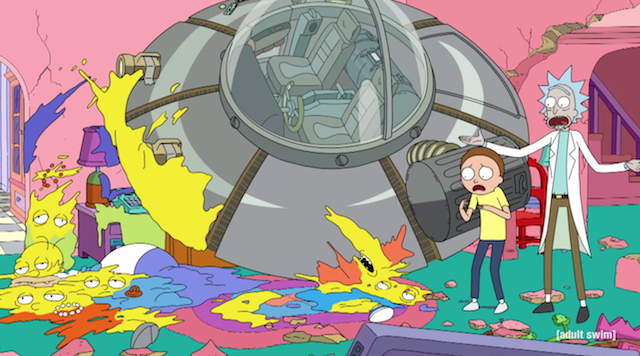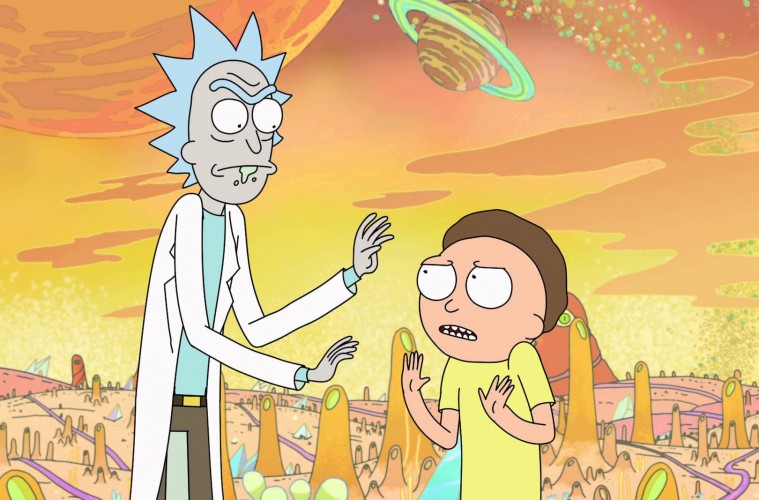Rick and Morty is a show unlike anything I’ve ever watched before, and I don’t say that lightly. It’s like a weird(-er) blend of Gravity Falls, Back to the Future (which is actually one of the inspirations for the show’s origins, and its influence remains in the form of Rick’s hair), and every nonsensical nightmare or fever dream you’ve ever had. And that’s just the first episode.
In a nutshell, it’s a show that’s been airing on Adult Swim, the PG-13 and up older sibling of Cartoon Network, starring its two main protagonist, Rick Sanchez and his fourteen-year-old grandson Morty Smith, Rick’s unwitting and sometimes unwilling partner in intergalactic adventuring.
I’ll admit, I only discovered Rick and Morty about a month ago, when I heard about it while surfing the Internet (and I only just discovered while writing this article that the show’s been around since 2013). I decided to give it a chance, but after the second episode I stopped watching it. The first two episodes of the show were vibrantly colored and full of non sequitur, violence, swearing, and strange creatures, and it assaulted my senses with equal doses of abrasiveness, discomfort, and confusion. The tipping point was Rick and Morty’s portaling to another dimension in episode one, where Rick badgers Morty into smuggling Mega Tree seeds through intergalactic customs, and the Inception-esque dream portaling in episode two, where Rick and Morty have to hide out from a Freddy Krueger parody named Scary Terry in a dream inside a dream inside a dream. I didn’t know how to feel after watching these two episodes, and I didn’t think I liked it. It unsettled me.
For reasons I still can’t fully rationalize (probably dogged determination more accurately labeled “stubbornness”, or perhaps curiosity), I gave the show a second chance. And that was probably the best decision I could have made. The aesthetic of the show doesn’t change the more you watch it; it’s still violent and abrasive and brightly colored and full of strangeness. Instead, your perception of the show changes, and it becomes familiar, even comforting. The world(s) and the science fiction elements become second nature, the twists and turns become less confusing and more understandable—or maybe you just throw your hands up and stop wondering where the ride is going to take you, content instead to enjoy it—and you ground yourself in Rick and Morty’s relationships with each other and the rest of their family to wrap your head around all the madness. The characters become family. And by episode four, where Morty is shrunk down to help Rick with his latest passion project, “Anatomy Park,” which, unsurprisingly, is housed in a dying homeless man and winds through his actual anatomy, I was hooked.
While the overarching weirdness and unconventionality of the show finally softened my reserve and drew me in, it’s not the reason I like it. The show itself reveals some alarming truths about the human condition wrapped in its vibrant sci-fi exterior, and that’s what makes it a cult classic and one of the best television shows I’ve ever seen. Rick and Morty understands that sci-fi doesn’t have to be all hard science, robots, and aliens, though the show has plenty of all three and more. It focuses on depicting realistic, fallible humans grappling with dangerous futuristic situations, each other’s emotions, and the space-time continuum, with the consequences as dangerous as the stakes are high. The show doesn’t shy away from showcasing what might happen to Earth if aliens did visit, or how individual lives would change or be destroyed if multiple dimensions were to somehow intertwine. When things like this happen in the Rick and Morty universe, or, more precisely, in dimension C-137, science usually provides the answer. But just because science has all the answers doesn’t mean those answers are right, or ethical, or good for humanity. In fact, Rick’s self-assigned place as the smartest human on the planet doesn’t make him noble, trustworthy, or even likeable. He’s an absolute jackass. But he’s smart, cunning, deceptive, logical to a fault, and someone you end up laughing with, rooting for, and even crying over (just wait until you get to season 2, episode three if you don’t believe me).
 Combine high stakes with imperfect humans, a sitcom-style family with marital problems, and failed dreams, and things can get heavy. It’s not enough that you can identify with a robot who, within ten seconds of its creation, questions its own purpose in life and has an existential crisis. You also identify with bewildered Morty struggling to understand the deeper meaning behind drunken Rick’s actions. You feel for Morty’s parents, Beth and Jerry, as they question the foundations of their marriage. You watch with queasiness as people and creatures die, sometimes accidentally, sometimes for kicks, usually gruesomely. The show’s nihilistic and pessimistic views on life get weighty, and the path it takes to showing humanity as real and fallible can be hard to swallow, but that’s what life is. Morty says it best when he has a heart-to-heart discussion with his sister, Summer, about her fear that her birth was a mistake: “Nobody exists on purpose. Nobody belongs anywhere. Everybody’s gonna die. Come watch TV?” It’s moments like this that give the show real emotional backbone and make you care about what happens to its characters, while also making you question your own existence.
Combine high stakes with imperfect humans, a sitcom-style family with marital problems, and failed dreams, and things can get heavy. It’s not enough that you can identify with a robot who, within ten seconds of its creation, questions its own purpose in life and has an existential crisis. You also identify with bewildered Morty struggling to understand the deeper meaning behind drunken Rick’s actions. You feel for Morty’s parents, Beth and Jerry, as they question the foundations of their marriage. You watch with queasiness as people and creatures die, sometimes accidentally, sometimes for kicks, usually gruesomely. The show’s nihilistic and pessimistic views on life get weighty, and the path it takes to showing humanity as real and fallible can be hard to swallow, but that’s what life is. Morty says it best when he has a heart-to-heart discussion with his sister, Summer, about her fear that her birth was a mistake: “Nobody exists on purpose. Nobody belongs anywhere. Everybody’s gonna die. Come watch TV?” It’s moments like this that give the show real emotional backbone and make you care about what happens to its characters, while also making you question your own existence.
Rick and Morty isn’t just a sci-fi show. It dips into the social science fiction subgenre at times, focusing on the relationships between the members of the Smith/Sanchez family, providing commentary about intergalactic interactions that touch on issues of class, race, and socioeconomic status, and showcasing interpersonal issues about how we value ourselves and treat others. All with additional dimensions, catchy slang phrases like “Wubbalubbadubdub,” and portal hopping. It’s weird and strange and fantastic, and definitely worth watching if you can get past the initial shock of its colorful, mad world.
Featured image via io9. Body image via ComingSoon.net.


